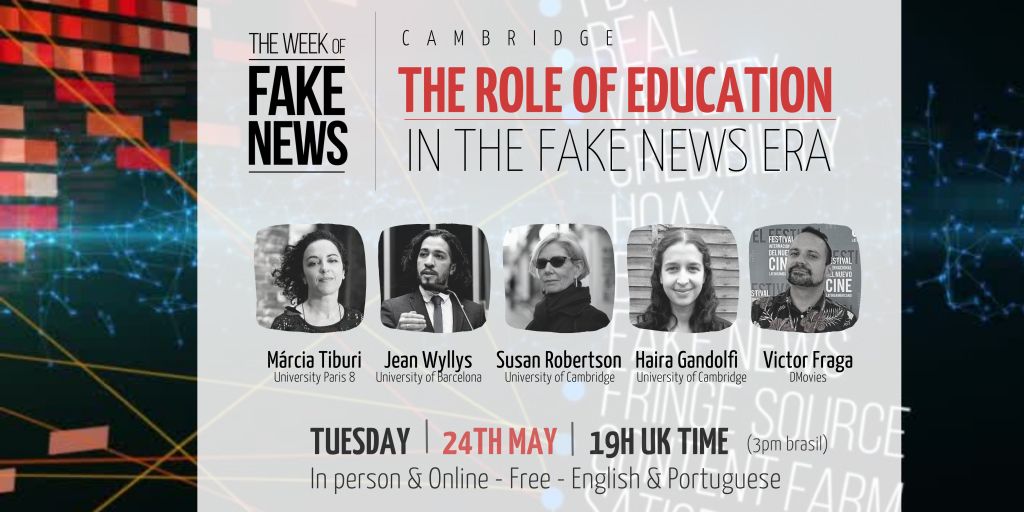

Academics and activists explore the role of education in the age of fake news

Two exiled Brazilian academics and the director of a powerful new documentary about media corruption will join scholars in Cambridge this month for a special event examining fake news, misinformation, and education.
The free, hybrid event (in person and online) – “The Role of Education in the Fake News Era” – will take place at the Faculty of Education on 24 May. Tickets are available now through Eventbrite.
It will feature a panel discussion about the role of teachers and educators in tackling fake news, with contributions from Jean Wyllys and Márcia Tiburi. Both are well-known academics and politicians from Brazil who have chosen to go into exile following the rise of its controversial President, Jair Bolsonaro, having been targeted by hate campaigns orchestrated by right-wing political groups.

There will also be a screening of The Coup d’État Factory: a new documentary about fake news and media manipulation in Brazil. Its co-director, Victor Fraga, is also speaking at the event, alongside Faculty academics Professor Susan Robertson and Dr Haira Gandolfi.
The film screening and panel discussion are part of the “Week of Fake News”: a one-off, cross-sector initiative involving partners including the University of Oxford, Kings College London and the British Film Institute. These events will explore how fake news, social media, misinformation campaigns and media bias have manipulated politics, affected democracy, and compromised the electoral process not only in Brazil, but in the UK, the US, and the wider world.
The Week of Fake News has been devised by Fraga: a Brazilian-born, London-based writer and film journalist. In The Coup d’État Factory, he seeks to show how media organisations in Brazil – notably its hugely powerful television network, TV Globo – have fomented and, at times, invented civil disorder to benefit parts of the country’s political establishment.
The film charts decades of media interference and manipulation, which culminated in a barrage of attacks on the Brazilian Workers’ Party in recent years. It argues that these acts were directly implicated in the impeachment of President Dilma Rousseff in 2016 and the sentencing of ex-President Luiz Inácio Lula da Silva on corruption charges in 2017. Ultimately, the documentary suggests this paved the way for Bolsonaro, who has been widely condemned for his misogynistic, homophobic and racist brand of populism. Ironically, he also has a complex and difficult relationship with TV Globo itself.
The documentary’s release has been timed to take place in the build-up to the 2022 Presidential election in Brazil. The Cambridge event, however, aims to push beyond discussions of Brazil and politics alone.
Instead, it will ask how education researchers and professionals can play a part in confronting misinformation, fake news and hate speech in an age in which these forces are challenging democracy internationally; not least in the UK. It will ask what educators can learn from the Latin American experience embodied by Fraga’s documentary, what teachers and other practitioners can and should do to address this, and how they can support students and communities to challenge various forms of media manipulation as thoughtful, critical citizens.
We want to start a debate about the part education can play in helping people to navigate a world of misinformation and rapid technological developments which are creating painful cleavages in society."
Márcia Tiburi and Jean Wyllys promise to bring a depth of experience personal insight to this challenge, as academics and activists who have had to distance themselves from their home country under Bolsonaro’s administration.
Tiburi is a philosopher, artist and writer who currently works in Paris and has written extensively about the rise of neo-fascism and its intersections with fake news, most recently The Psycho-cultural Underpinnings of Everyday Fascism. In 2018, she ran for the governorship of Rio de Janeiro, finishing seventh on a platform that was described as “radical democratic, feminist, anti-racist and capitalist”. Later that year she left the country, claiming that she had been targeted with death threats instigated by the Free Brazil Movement - a right-wing activist group which has been criticised for spreading fake news.
Wyllys, a political scientist at the University of Barcelona, researches the relationship between fake news and authoritarian governments. He was also Brazil’s first openly gay MP. His prominent activism on LGBT+ issues and other agendas brought him into direct confrontation with Bolsonaro on numerous occasions when the latter was still a congressman. Wyllys was targeted in a series of fake news attacks, some of which resulted in death threats. In January 2019, he, too, announced that due to ongoing attacks, he was resigning as a congressman and leaving the country.
The Cambridge event has been organised by the Cambridge University Brazilian Society, The Cambridge Latin American Research in Education Collective (CLAREC), and the Centre for Research in the Arts, Social Sciences and Humanities (CRASSH).
Alexandre da Trindade, from CLAREC, said: “Wherever you live, fake news poses a real threat to the future of democracy. We want to start a debate about the part education can play in helping people to navigate a world of misinformation and rapid technological developments which are enabling populism, threatening liberties, and creating painful cleavages in society.”
Tickets for The Role of Education in the Fake News Era are available now.
Image in this story: nadeeshxJayawaradena via Pixabay.